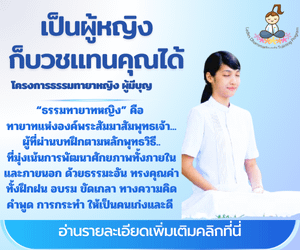ธรรมะ | Dhamma
1. ความหมายของธรรมะ | Meaning of Dhamma
คำว่า “ธรรมะ” ในภาษาบาลี แปลว่า ธรรมชาติหรือกฎเกณฑ์ที่ควบคุมทุกสรรพสิ่งให้ดำเนินไปตามครรลอง โดยมีความหมายกว้างกว่าศีลธรรมที่ใช้กันทั่วไป และสามารถใช้หมายถึงสัจธรรม (ความจริงสูงสุด) ที่ควรเรียนรู้เพื่อเข้าใจสภาพความเป็นจริงของชีวิต หลักคำสอนของพระสัมมาสัมพุทธเจ้าใช้ธรรมะเป็นเครื่องชี้นำชีวิต โดยให้เราใช้ธรรมะเพื่อพัฒนาตนเองไปสู่ความบริสุทธิ์ผุดผ่องทางกาย วาจา ใจ
In Pali, the word “Dhamma” refers to the natural laws or universal truths governing all things, encompassing more than just moral conduct. It also signifies ultimate truth that one should understand to grasp the true nature of existence. According to the Buddha’s teachings, Dhamma is a guide for self-cultivation toward purity in body, speech, and mind, helping individuals transcend suffering and achieve liberation.
2. ธรรมะในมิติของคำสอนพระพุทธเจ้า | Dhamma in the Context of the Buddha’s Teachings

พระสัมมาสัมพุทธเจ้าทรงสอนธรรมะในมิติที่เป็นหลักการและแนวปฏิบัติเพื่อให้มนุษย์พ้นจากทุกข์และบรรลุนิพพาน ซึ่งแบ่งออกเป็น 4 ขั้นตอนสำคัญ คือ อริยสัจ 4:
The Buddha’s teachings on Dhamma encompass fundamental principles and practices designed to lead beings to freedom from suffering and the attainment of Nirvana. These teachings are encapsulated in the Four Noble Truths:
- ทุกข์ (Dukkha) หมายถึงสภาวะที่เกิดความไม่พอใจ ความทุกข์ใจหรือการประสบกับสิ่งที่ไม่อยากพบ | The reality of dissatisfaction, suffering, or discomfort, which arises from encountering the undesired.
- สมุทัย (Samudaya) คือสาเหตุของทุกข์ ซึ่งเกิดจากตัณหา อันได้แก่ กามตัณหา (อยากได้), ภวตัณหา (อยากเป็น), และวิภวตัณหา (ไม่อยากเป็น) | The cause of suffering, rooted in craving (tanha), which includes kamatanha (craving for pleasure), bhavatanha (craving for existence), and vibhavatanha (craving for non-existence).
- นิโรธ (Nirodha) คือความดับทุกข์ ความสงบที่ได้มาจากการละทิ้งตัณหา | The end of suffering, achieved by eliminating craving.
- มรรค (Magga) คือวิถีทางในการดับทุกข์ ประกอบด้วย มรรค 8 ข้อ ได้แก่ สัมมาทิฏฐิ, สัมมาสังกัปปะ, สัมมาวาจา, สัมมากัมมันตะ, สัมมาอาชีวะ, สัมมาวายามะ, สัมมาสติ และสัมมาสมาธิ | The path leading to the cessation of suffering, known as the Noble Eightfold Path: Right View, Right Intention, Right Speech, Right Action, Right Livelihood, Right Effort, Right Mindfulness, and Right Concentration.
3. ธรรมะในชีวิตประจำวัน | Dhamma in Daily Life
ธรรมะไม่ใช่เพียงแต่หลักการทางปรัชญาหรือการปฏิบัติทางศาสนา แต่สามารถประยุกต์ใช้ในชีวิตประจำวันเพื่อให้เรามีความสุขและอยู่ร่วมกันในสังคมได้อย่างสันติ ธรรมะในชีวิตประจำวันคือการมีเมตตาต่อผู้อื่น ฝึกจิตให้รู้จักพิจารณาและละเลิกสิ่งไม่ดี ซึ่งจะทำให้เราใช้ชีวิตอย่างมีสติและไม่ตกอยู่ในทุกข์
Dhamma is not limited to philosophical doctrine or religious rituals; it can also be applied in daily life to bring peace and harmony within oneself and with others. Practicing Dhamma in daily life includes showing kindness, cultivating a calm mind, and renouncing harmful actions. This approach leads to a life lived with awareness and freedom from unnecessary suffering.
4. การปฏิบัติธรรมเพื่อพ้นทุกข์ | Practicing Dhamma to Overcome Suffering
การปฏิบัติธรรมตามหลักคำสอนของพระพุทธเจ้าเป็นการฝึกฝนตนให้พ้นจากกิเลส ด้วยการเจริญสติสมาธิและปัญญา โดยเริ่มจากการฝึกสติในชีวิตประจำวัน ไม่ว่าจะเป็นการหายใจเข้าออก การเดิน การนั่ง ซึ่งทำให้เรารู้เท่าทันสภาวะของจิตใจ และส่งผลให้เกิดปัญญารู้แจ้งในความไม่เที่ยงของสรรพสิ่ง
Practicing Dhamma, as taught by the Buddha, involves training oneself to overcome defilements by developing mindfulness, concentration, and wisdom. This begins with mindful breathing, walking, and sitting, which allows one to become aware of the mind’s fluctuations. This awareness leads to insight into the impermanent nature of all phenomena, fostering wisdom that transcends suffering.
5. ธรรมะเพื่อการพัฒนาจิตใจสู่สันติสุข | Dhamma as a Path to Inner Peace
ธรรมะเป็นเส้นทางแห่งสันติสุข ที่นำเราไปสู่การพัฒนาจิตใจให้มีความเมตตากรุณา อ่อนน้อมถ่อมตน และไม่เบียดเบียนผู้อื่น พระพุทธเจ้าทรงสอนว่า การปฏิบัติธรรมจะช่วยให้เราพ้นทุกข์และไปถึงการบรรลุนิพพาน ซึ่งเป็นสภาวะที่สิ้นสุดทุกข์ทั้งปวง
Dhamma serves as a path to peace, fostering compassion, humility, and non-harming towards others. The Buddha taught that practicing Dhamma enables one to overcome suffering and ultimately attain Nirvana, the state where all suffering ceases.
6. สรุป | Conclusion
ธรรมะตามคำสอนของพระพุทธเจ้าเป็นหลักการที่สอนให้เรามีความเข้าใจในสัจธรรมของชีวิตและจักรวาล โดยนำมาประยุกต์ใช้ในการดำเนินชีวิตประจำวัน ซึ่งจะช่วยให้เราพ้นจากทุกข์และมีชีวิตที่เปี่ยมสุข
The Buddha’s teachings on Dhamma guide us to understand the truths of life and the universe, encouraging us to integrate these insights into our daily lives. This practice supports us in overcoming suffering, fostering inner peace, and living a fulfilling life.
อ้างอิง | References
- พระไตรปิฎกแปล ภาคภาษาไทย (พระไตรปิฎกฉบับมหาจุฬาลงกรณ์ราชวิทยาลัย) | The Thai Tipitaka (Maha Chulalongkorn Rajavidyalaya Edition)
- หลักธรรมแห่งพระพ


















